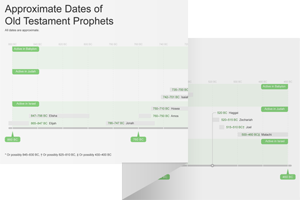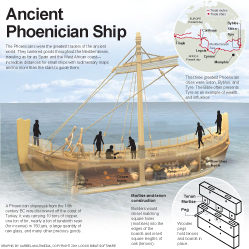1:1–6 The book of Jonah |
1:1 the word of Yahweh The book of Jonah opens with a traditional Hebrew formula meaning “now it came about” (compare Josh 1:1; Judg 1:1; Ruth 1:1; 1 Sam 1:1; 2 Sam 1:1; Esth 1:1). Ezekiel is the only other Prophetic book to begin this way (Ezek 1:1).
 Prophetic Commissioning and the Divine Presence
Prophetic Commissioning and the Divine Presence
Jonah The name Jonah means “dove.”
Jonah was from Gath Hepher (meaning “winepress of the pit”), a town in lower Galilee near Nazareth (2 Kgs 14:25). The town has been identified with the modern village of el-Meshhed, where the tomb of Jonah is still shown. Gath Hepher was within the tribal territory given to Zebulun (see Josh 19:10, 13), so it is likely Jonah belonged to that tribe. Jonah ministered during the reign of Jeroboam II of Israel (793–753 bc; 2 Kgs 14:23–25). |
the son of Amittai Means “truth” or “faithfulness.”
1:2 the great city Nineveh Nineveh was a major metropolis, one of four great cities of Assyria (see note on 2 Kings 19:39). Compare Jonah 4:11.
cry out against her The message that Jonah is to preach is supplied in 3:4.
their evil A general reference to the city’s violence, immorality, and idolatry.
1:3 toward Tarshish Probably Tartessus in southern Spain, perhaps the most distant city known to Israel. Tartessus was a Phoenician colony. At this time, Phoenicia was a close ally of Israel, an alliance solidified with the marriage between King Ahab of Israel and Jezebel, a Phoenician princess. See note on Isa 23:1.
to Joppa The closest port to Jerusalem.
Joppa, |
1:4 the sea The Mediterranean Sea.
1:5 And the mariners were afraid If these sailors were Phoenicians, then the storm must have been terrible indeed. The Phoenicians were legendary for their seamanship and navigating skills.
his god At this time, individuals often had their own personal god that they worshiped above all others.
to lighten it for them A lighter ship is easier to control in the midst of a storm.
the hold of the vessel The area below the main deck where sailors slept.
1:6 the captain of the ship The Hebrew text here literally reads “the chief sailor.”
Why are you sound asleep The captain cannot believe Jonah is sleeping; he calls him to wake up and pray for Yahweh to calm the storm.
1:7 let us cast lots The casting of lots was common throughout the ancient Near East as a way of allowing the gods to make their decisions known to people (see Esth 3:7).
was common throughout the ancient Near East as a way of allowing the gods to make their decisions known to people (see Esth 3:7).
this disaster The Hebrew term for evil is used here in the sense of calamity or disaster.
1:9 I am a Hebrew This title first appears in Gen 14:13 to differentiate Abram from the Amorites among whom he lived. The term always appears in interaction with foreigners, being used by foreigners to describe Israelites or by Israelites to describe themselves to foreigners.
I fear Yahweh The term used here can be translated as “fear” or “worship,” which is the connotation here.
the God of heaven This title is rarely used prior to the exile (see Gen 24:3, 7; Ezra 1:2; 5:11, 12; 6:9, 10).
the sea and the dry land A figure of speech indicating totality (called a merism) acknowledging Yahweh’s sovereignty over all creation.
1:10 from the presence of Yahweh Literally, “from the face of Yahweh.”
1:12 hurl me into the sea The Hebrew term here is the same word used in Jonah 1:4 to describe Yahweh causing the great storm.
1:14 do not make us guilty of innocent blood The sailors do not want to be held guilty for killing Jonah.
1:15 the sea ceased from its raging The term used here conveys the idea of calm or stillness.
1:16 So the men feared Yahweh greatly See note on v. 5. The word yire'u, meaning “feared,” is used here in the sense of worship. Jonah claimed to fear Yahweh, but the non-Jewish sailors are the ones who actually show Him proper reverence.
 Fearing God in the Old Testament
Fearing God in the Old Testament
feared Yahweh greatly This term occurs six times in this chapter (see vv. 2, 4 [twice], vv. 10, 12).
made vows A solemn promise to God to do something or to abstain from something. In this instance, the sailors might have vowed to worship Yahweh and forsake all other gods.
1:17 provided This term is used repeatedly in Jonah to emphasize Yahweh’s sovereignty (see 4:6, 7, 8).
a large fish This is the general term for all kinds of fish; it does not refer specifically to a whale. No fish is mentioned by name in the ot or the nt.
three days and three nights This phrase can refer to a full day and parts of two others (see Matt 12:40).

|
About Faithlife Study BibleFaithlife Study Bible (FSB) is your guide to the ancient world of the Old and New Testaments, with study notes and articles that draw from a wide range of academic research. FSB helps you learn how to think about interpretation methods and issues so that you can gain a deeper understanding of the text. |
| Copyright |
Copyright 2012 Logos Bible Software. |
| Support Info | fsb |
 Loading…
Loading…


 Jonah
Jonah 
 Joppa
Joppa 